|
Q: What was your overall role?
A: Producer, Director, Scrip Writer.
Q: Did you always want to be in the film Industry?
A: Not always. However, I wanted to be a filmmaker occasionally. I
had a fascination for film since my childhood, as I was raised in a
cultured and enlightened family. My father used to take us to the
cinema and we enjoyed good films together. Gradually, I came to know
about the famous filmmakers of the East and West, which inspired me
dreaming for film making in future.
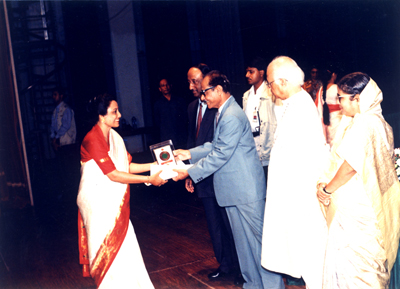 Q:
Tell us how Fight Acid evolved. Q:
Tell us how Fight Acid evolved.
A: Acid attack on girls and women in Bangladesh was a burning issue
for more than three decades. But I never thought to make a
documentary on acid attack. I have a friend in the USA, named Heidi
Basch-Harod. She is the Executive Director of Women's Voices Now (WVN)
based in Los Angeles, California. Her activities focus on women's
issues and particularly, the Muslim women of Asia, Middle East and
Africa. We have regular email conversation on various issues. She
always appreciated my work and inspired me to focus on women issues.
In 2013, she posted a short video on acid attack on the website of
WVN. The video was made by a Pakistani American student named Ifrah
Sheikh. After watching it, I decided to work on acid attack in
Bangladesh, and accordingly, started data collection and research on
it. In January 2013, a college student of Dhaka city became a victim
of acid attack. I at once went to see her in the hospital, talked to
her mother and brother. This prompted me to make a documentary.
Q: Did you have any unusual difficulties during filming?
A: From the very beginning of filming and till the end, I had to
face lot of difficulties. Firstly, the situation of the country was
not favorable. Due to political turmoil, the situation was very
panic and unrest. Protest, strike, burning vehicles, blockage and
violence on the street were the regular occurrence. It was not safe
to move out in the city and outside the city. Amidst this violent
situation, shooting was very much difficult and challenging. In
addition, I was afraid as acid attack was a sensitive issue.
People in the family and others asked me, 'why did you plan to
make documentary on such a sensitive and risky issue?' Sometimes,
this made me up set. But I became desperate to complete my project.
Secondly, getting fund was another big challenge. At first, I
tried to gather fund locally and approached to a number of
organizations. Unfortunately, I did not get any positive response.
Then I shared this with Ms. Heidi Basch-Harod, and she introduced me
with the Lantos Foundation for Human Rights & Justice USA. They have
a Frontline Fund grant for research and activities on Human Rights.
The amount is US $ 500-2500. They gave me the highest amount $ 2500
(Two Lac in BGD currency).
Then I faced another difficulty. I could not draw the money in
Bangladesh because of some difficult and corrupted people. This is a
long episode. Finally, I requested Lantos Foundation to withdraw the
fund saying that I would collect it from the USA. Then I planned for
a trip to USA, which cost me more than the fund amount. Meanwhile, I
started shooting a few sequences, recorded background music, songs
etc.
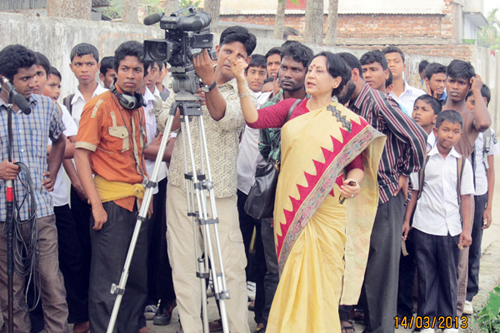 Thirdly,
it was another challenge to get access to the Acid Survivors
Foundation-ASF in Bangladesh. At the beginning, my script was
different. I planned to make the whole documentary inside the ASF.
However, it was not easy to convince the authority. There is a
genuine cause that they should not allow anyone to make videos of
the acid victims. Lantos Foundation helped me in this regard. They
gave a fund to Acid Survivors Foundation and then ASF authority
allowed me to take the interview. Thirdly,
it was another challenge to get access to the Acid Survivors
Foundation-ASF in Bangladesh. At the beginning, my script was
different. I planned to make the whole documentary inside the ASF.
However, it was not easy to convince the authority. There is a
genuine cause that they should not allow anyone to make videos of
the acid victims. Lantos Foundation helped me in this regard. They
gave a fund to Acid Survivors Foundation and then ASF authority
allowed me to take the interview.
Q: Will winning awards help promote the film? How so?
A: Winning awards is the best recognition and appreciation to the
filmmakers. This is a big reward in terms of judgement, value and
publicity of a winning film and also the filmmaker. Festivals bring
the opportunity of big audience to watch the winning films. Award
winning also inspires the filmmakers to continue their work.
Q: How much money did it cost?
A: It cost 7000 US Dollar including the Fund of Lantos Foundation ($
2500) and my own money.
Q: How did you finance that?
A: I got some support from my family and the rest from my own.
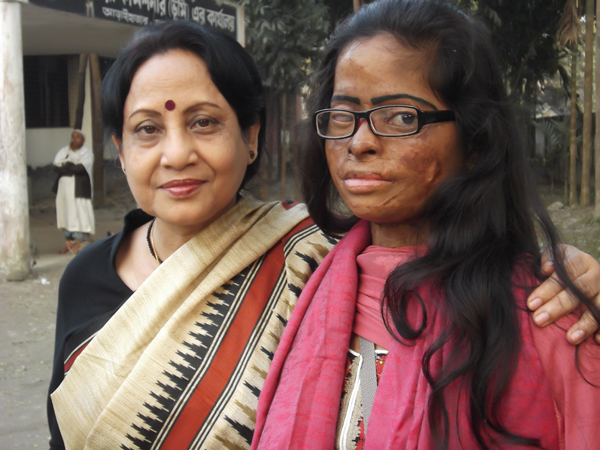 Q:
Where were the locations? Q:
Where were the locations?
A: The locations were mainly in three districts of Bangladesh -
Dhaka, Kishoreganj and Naraynganj.
Specific locations were Dhaka City, Burn Unit of Dhaka Medical
College Hospital, Acid Survivors Foundation and its hospital,
Hashmat Uddin High School, Kishoreganj, Judges Court, Kishoreganj,
Police Station, Kishoreganj, Kishoreganj District Hospital and
Assistant Collector's office, Narayanganj where an acid survivor
Hasina works as a Record Keeper.
Q: To what audience is your film suited?
A: General Public, Students, Teachers, Law Enforcement Authority,
Policy Makers, Doctors, Ministry of Law and Parliamentary Affairs,
Ministry of Information, Ministry of Social Affairs, Ministry of
Children and Women Affairs, The Heads of District Administration,
Police Stations, and the NGOs working on women issues, both Print
and Electronic Media - Radio and Television.
Q: Any bites yet from distributors?
A: Yet not. People are still shaky about acid attack. It may take
time to find distributors.
Q: What was it like working with various sources? How did you
go about choosing who to interview?
A: I got positive response from various sources - from the media
people, from the legal authorities and many other sources. It was a
bit tough to choose who to interview. Ferdous Faisal, a journalist
of the Daily Prothom Alo (the leading Bengali newspaper) gave me lot
of information and also assisted me finding other sources. The
coordinator of Acid Survivors Foundation A K Azad helped me to
interview the acid survivors, doctor and others in ASF. Aziz Ahmed
Bhuyan, the former Additional District Judge of Kishoreganj district
gave me information and helped for shooting at the Judges Court and
the high school.
Q: What has the feedback been so far?
A: The feedback is good. The documentary was screened in two film
festivals in Bangladesh, in the schools, courts and other venues.
People now can talk and discuss about acid attack. I was interviewed
by four national TV channels. There will be more screening this
year. Fight Acid Violence was also screened in the online film
festivals by Citizen TV, USA, Women's Voices Now, USA, Culture
Unplugged (Worldwide) and is supposed to participate in a few
international film festivals in 2016. It was accepted for Ammar
Popular Film Festival (APFF) in Iran.
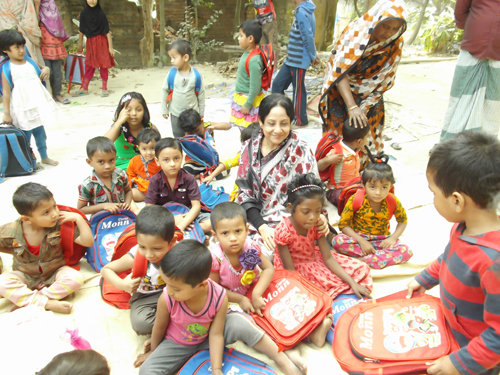 Q:
Are you working on any new projects? Q:
Are you working on any new projects?
A: Yes, I have started a new film project on Health and Environment.
It will be a feature film. I have also planned to make two
documentaries in 2016. One is on Child Marriage and another one on
the Potters and Pottery Work of Bangladesh.
Q: Tell us about your own background. Where you were born?
Where did you study film? What was your first movie? What was your
previous job? Are you a full-time filmmaker?
A: I was born and raised in Bangladesh. I studied in Bangladesh and
India. My PhD is on Comparative Literature from Visva-Bharati
University, Santiniketan, India. While studied in India, I had the
opportunity to watch good movies, theatres and to interact with
writers, filmmakers and actors of India. I studied books and
articles on filmmaking and participated in a few workshops.
My first movie is a documentary on fokllife and cultural heritage
of Bangladesh titled Meghdubi (the name of a village). In 1994-95, I
did research on Folklore and cultural heritage as a Senior Fellow of
Ford foundation, USA. At that time, I wrote a Monograph on Folk
Rituals of Bangladesh and a Ballad titled Meghdubi based on folk
elements and traditions. Later on in 2008, I produced the
documentary while I was invited to attend the Annual Smithsonian
Folklife Festival in Washington DC, USA.
I was a research scholar of ICCR, India, Senior Fellow of Ford
Foundation, worked with the Ministry of Education, Bangladesh, UN
Peacekeeping Mission in Cambodia, worked with various national and
international organizations. In addition, I taught in school,
college and university in Bangladesh and India. In connection with
my work, I have interacted with many people of different countries.
It had a great impact on me and that's why I am conscious about
social issues and problems related to women and children. I am a
humanist and moralist, have been associated with voluntary and
humanitarian activities since 1991. I want to focus on various
aspects of social problems through my writings and films.
I am not a full-time filmmaker. But I have chosen to make films
side by side with my other works, as visual media is the most
powerful tool to communicate and create awareness on various social
issues.
Q: What was your first award? And how did you feel at that
time?
A: My first award was for writing and publishing educational
materials. I got a national award in 1997 for producing the Best
Innovative Education Materials on the occasion of International
Literacy Day on 8 September.
In 2015, I received two awards, one for my social service -
Freedom Inspiring Future Leaders Award and another Filmmaker Award.
My first award for film is the Filmmaker Award in 2015, given by
the Women's Film Society Bangladesh on 14 March on the occasion of
Second International Women's Film Festival Bangladesh held in Dhaka
from 14-17 March 2015.
My documentary film Fight Acid Violence got Audience Award
out of 70 films from 30 countries around the world.
Winning award is the best recognition and I was very happy to
receive it. The award inspired me to make more films focusing on
social issues and discrimination.
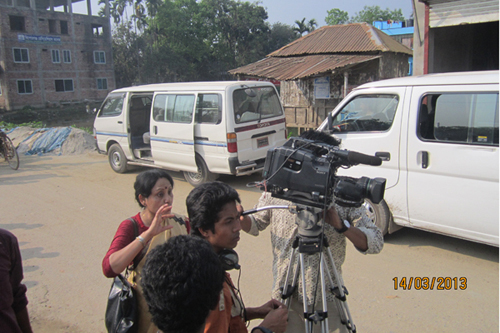 Q:
What was the best part of the project? Q:
What was the best part of the project?
A: To my opinion, interviewing the acid survivors was the best part
of the project.
Q: What was the most challenging?
A: Shooting outside Dhaka city was the most challenging like acid
throwing in the school, trial shot in the Judges Court etc.
Q: Are you pleased with the overall outcome?
A: Yes.
Q: What are your hopes and dreams for the film?
A: I hope to make more inspiring films and documentaries that will
highlight the issues on women, children, health, environment,
climate change and threats on heritage. And my films will
participate in the film festivals around the world.
Q: How long did it take to complete the film?
A: It took one year to complete the documentary film on acid attack.
Q: Will you do a sequel?
A: May be in future.
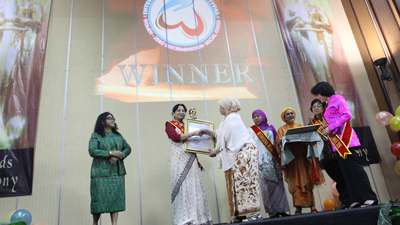 Q:
How do you feel to have won awards in IFFWSZ 2016? Q:
How do you feel to have won awards in IFFWSZ 2016?
A: I am very happy to win awards in IFFWSZ 2016. It's a great
recognition to my work!
Q: What makes you a filmmaker?
A: Social issues are the main causes that made me a filmmaker. In
the present world, visual media is a powerful tool to highlight the
social issues, to communicate people, raise public awareness and put
pressure on the policy makers to solve the problems.
Q: Why is this subject important to you?
A: Acid throwing is a heinous crime, which is beyond humanity. Many
girls and women have already died after acid attack. Those who are
surviving with their disfigured face and body, they are not treated
well in the society and family as well. They are deprived of normal
life. They need support, care and rehabilitation. I want to draw
attention of the policy makers and others to support acid survivors.
In many cases, the criminals are escaped of trial due to the
weakness of law. They can easily get bail from the court and again
threat the acid survivors. This should be stopped.
Q: Does this film send the message you intended?
A: Definitely.
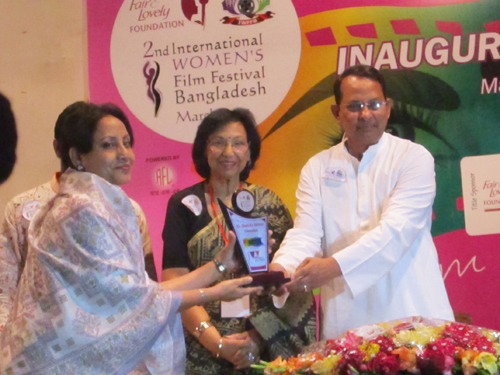
Q: Do most people just turn a blind eye when they hear of
these issues?
A: In fact, most people are afraid of hearing about acid attack,
though they have sympathy for the acid victims. However, people come
out of home to help the acid victims. They inform the police, and
join the rally and demonstration against acid throwing. Recently,
people's attitude and social trends have been changed. In some
places, the acid survivors are getting jobs, which could not be
imagined before.
Q: Why the title?
A: We have to fight against the heinous crime 'acid attack', so that
it can be stopped for ever. The victims are still fighting to
survive.
Q: Advice to others who might like to follow in your
footsteps?
A: Filmmakers should be conscious and aware of social issues and
causes against humanity. Because, film can be the showcase of our
society, our history, our environment, and it can be the reflection
of our values, our empathy and judgment. Filmmakers can be the
change maker and they may work together to make the world a better
place.
Q: Is there anything in the past happened to you that make you
make this movie? If, yes, what is this?
A: Yes, I had a threat of acid attack in the early 1990's by someone
with bad intension.
Q: Is this a film that young people, college or high school
students could benefit from?
A: Of course. Young girls, college & high school students are the
main victims of acid attack. They will be benefited.
Q: Do you personally know anyone who inspires the movie?
A: Yes. She is a college student and a victim of acid attack.
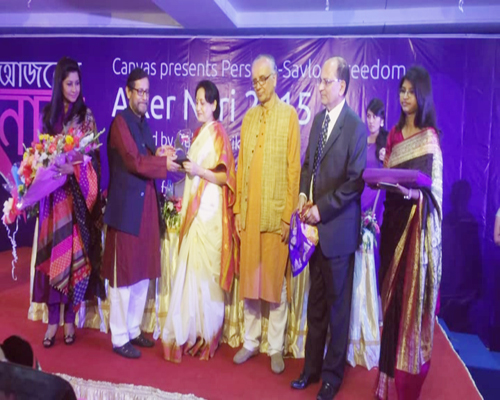 Q:
Has the film won any other awards? Q:
Has the film won any other awards?
A: It won Audience Award in Bangladesh on the occasion of Second
International Women Film Festival Bangladesh 2015.
Q: Anything new to date on the film?
A: The film will be screened in various venues in Bangladesh soon,
and a few international film festivals.
Q: Unique stories during the making of the film?
A: There are many stories behind my film making. I wanted to
interview a survivor and talked to her on phone. She is working with
a government community clinic. But she did not want to give
interview, as her perpetrator was given bail from the court. He
influenced the law enforcement authority to come out from jail. The
man wanted to marry her and he threw acid on her when she refused
him. After getting free, he threatened to kill her. There are many
similar cases. A few acid survivors are working with an organization
in Dhaka supported by a US NGO. I went to talk to them. But they did
not agree to say about their attack.
Q: What sacrifices did you make to become a filmmaker?
A: My family members, colleagues and others did not want to see me
as a filmmaker. I had a different career and I just ignored other
works for becoming a filmmaker. Our society is still conservative
about women and their career. They do not take easily when a woman
becomes filmmaker.
Q: How do you see yourself in the next 10 years?
A: I have a passion and determination to make a few good films in
the next 10 years. As an author, I will continue my writings
including my memoir. I work for an ideology to help underprivileged
section of the society. Therefore, I need to give time for my
charity works. Besides these, I want to be an established filmmaker
and earn reputation worldwide. I have a mission and goal. Wish I
could fulfill my dream.
Thank you so much.
Photos information:
- Receiving National Award from the President of Bangladesh on 8
September 1997, the International Literacy Day.
- During shooting Fight Acid Violence
- Shahida Akhter with acid survivor Hasina in Narayanganj. Dec. 2013
- Happy moment with child learners of CEWS school in a village.
- Receive award from Advisor Council of Creative People and sister
of former Indonesian President, Lily Wahid, Minister of Social
Affairs Dra. Khofifah Indar Parawansa, President Director of Public
Broadcasting Radio Republik Indonesia Dra. Rosarita Niken Widiastuti
M.Si., Minister of Environment and Forestry Dr. Ir. Siti Nurbaya
Bakar, M.Sc.
- Filmmaker Award from the Minister for Information, awarded by
Women's Film Society Bangladesh
- Receiving Crest from the Minister for Cultural Affairs of
Bangladesh, 8 March 2015 |

